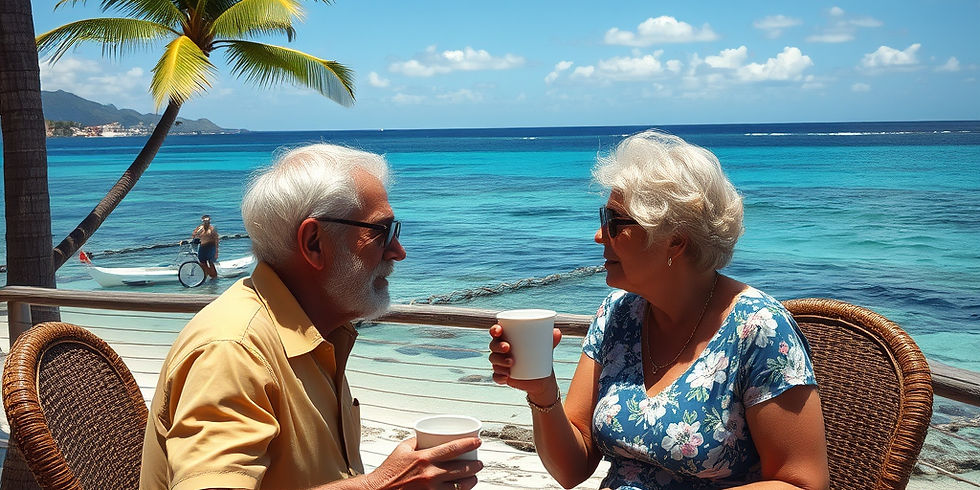Understanding Fees and Taxes When Buying Property in the Dominican Republic
- maplepalmrealty
- Oct 16, 2025
- 4 min read
Buying property in the Dominican Republic is an exciting venture. However, it’s essential to understand the fees and taxes associated with the process. Navigating these financial obligations can seem daunting, especially for first-time buyers. This guide breaks down the main fees and taxes you'll encounter when purchasing property, including legal fees, land transfer taxes, and annual property taxes. It aims to provide clarity and encourage you to reach out with any questions.

The Financial Landscape of Buying Property in Dominican Republic
When investing in real estate in the Dominican Republic, it's crucial to budget not just for the property price but also for the accompanying fees and taxes. These can add up quickly, so you want to ensure you're well-informed about what to expect financially.
This includes legal fees, notary fees, and transfer taxes, which are all necessary to ensure a smooth transaction.
Legal Fees: What to Consider
One of the significant costs you will incur when buying property is legal fees and closing costs. In the Dominican Republic, it is highly recommended to hire a qualified attorney specializing in real estate transactions.
Legal fees cover various services, including conducting a title search to confirm ownership, preparing the purchase agreement, and managing the closing process. While it may seem like an additional expense, engaging a professional can save you from potential legal complications down the line.
Typically for a standard purchase, the legal fees will run in the 1% of the purchase price range (to a minimum of $800). This is paid in full to your lawyer at closing.
Land Transfer Taxes: An Overview
Another essential fee associated with buying property in the Dominican Republic is the LAND TRANSFER TAX which is paid at closing. Land transfer taxes are equivalent to 3% of the assessed value of the property as determined by the government tax office (this amount tends to be lower than the selling price). This is paid on closing and is a tax due to transfer the title to the buyer’s name.
For example, if you're purchasing a property assessed at $200,000, you could expect to pay approximately $6,000 in land transfer taxes. It's critical to factor this into your budget to avoid any financial surprises during the purchasing process.
Annual Property Taxes: What You Should Know
Once you've acquired your dream property, ongoing costs will arise, including annual property taxes. In the Dominican Republic, property taxes (also known as "Impuesto sobre la Propiedad Inmobiliaria") are generally quite low compared to other countries, amounting to 1% of the property's assessed value.
For instance, if your property is assessed at $200,000, the annual property tax would be around $2,000. Keeping track of these costs can help ensure that you maintain your property in good standing with local authorities.
How Annual Property Taxes Are Assessed
For built lots, the 1% is calculated only for properties appraised over $150,000 USD.
For unbuilt lots, the 1% is calculated on the actual appraised value without the exemption.
The real estate tax is payable every year on or before March 11, or in two equal installments: 50% on or before March 11, and the remaining 50% on or before September 11.
The amount of the exemption is adjusted annually for inflation.
The following properties are exempt from paying real estate tax:
farm properties;
homes whose owner is 65 years old or older, and has no other property in his or her name; and
properties owned by companies, which pay a separate tax on their company assets.
Additional Fees to Consider
Besides the primary fees discussed, several other costs may arise during the purchasing process:
Utilities and Community Fees: If your property is in a gated community or has shared amenities, additional monthly or yearly fees may apply.
Being aware of these potential expenses will help you plan and budget more effectively for your real estate investment.

Engaging with the Process
Navigating the purchase of property in the Dominican Republic can be challenging, but it doesn't have to be overwhelming. By familiarizing yourself with the fees and taxes associated with property buying, you can make informed decisions. Moreover, working with professionals like real estate agents and lawyers will streamline the process.
If you have any questions regarding buying property, feel free to reach out. Our team at Maple Palm Real Estate is always here to help guide you through the experience.
Your Next Steps in the Buying Process
After gaining an understanding of the financial obligations associated with purchasing property, the next step is to start your property search. Think about what features are most important to you: location, size, or amenities?
Consider creating a wish list, and don’t hesitate to share this with your real estate agent. They can help tailor the search to fit your desires and budget. Since the market can be competitive, be prepared to act quickly when you find a property that meets your criteria.
Finally, remember that the process can involve numerous documents and legal requirements. Stay organized and maintain close communication with your legal representative to ensure everything runs smoothly.
Investing in property in the Dominican Republic can be immensely rewarding. With the right knowledge and support, you're one step closer to making your dream investment a reality. Happy house hunting!
If you have any questions at all please don't hesitate to contact me anytime.
If you prefer to see videos of properties for sale :
If you would like to chat now please click link below to WhatsApp chat:
☎️WhatsApp: https://wa.me/1829863063




Comments